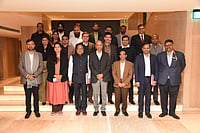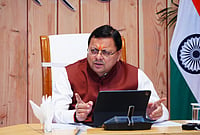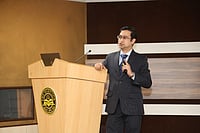Prof. T.G. Sitharam, Chairman of AICTE, discusses how India’s ‘Enhancing Human Capital’ initiative is transforming the nation’s demographic strength into an AI-driven future rooted in ethics, education, and empathy
Q: Professor Sitharam, enhancement of human capital has captured public imagination as the ‘Enhancing human capital of AI’. What is its central objective?
Prof. Sitharam: Enhancing human capital is designed as a national convergence of thought before the Global AI Impact Summit 2026. Its objective is simple yet transformative: to place human capital at the very centre of India’s AI journey toward Viksit Bharat@2047.
We are no longer speaking of AI as a mere technology. We are treating it as a civilisational force that must be governed by ethics, empathy, and education. Enhancing human capital serves as the “first draft” of India’s human capital declaration, a rehearsal in collective imagination. It brings together academia, industry, policymakers, and students under one vision: to turn India’s demographic dividend into an AI dividend.
Q: How does enhancing human capital connect with the ‘Global AI Impact Summit 2026’?
Prof. Sitharam: Think of enhancing human capital as the preamble and the Summit as the constitution. Enhancing human capital allows India to test, debate, and refine its frameworks on education, research, policy, and ethics before taking them to the global stage.
Every session here, whether on education reform, talent pipelines, or AI governance, aligns with the 13 thematic tracks of the upcoming Summit. The conclusions drawn through AI-assisted synthesis during the Enhancing Human Capital will directly feed into the 2026 Declaration on Human Capital as the Central Pillar of AI’s Global Future.
India is not just hosting the summit; it is shaping its grammar. Enhancing human capital gives India moral and intellectual authority to say, 'We practised before we preached.'
Q: The key, as mentioned by you, is six pillars: education, research, talent, policy, collaboration, and CSR. Could you elaborate on their intended outcomes?
Prof. Sitharam: Each pillar addresses a structural gap in India’s preparedness for the AI century.
Education Reform ensures AI is embedded in every curriculum — not as a course, but as a cognitive lens.
Research and innovation demand that 5 - 10% of institutional earnings be reinvested in applied or foundational AI research.
Talent Pipeline builds continuity through mini AI summits, certifications, and lifelong learning modules.
Policy and Regulation develop safe and transparent AI frameworks that balance innovation with public trust.
International & Institutional Collaboration links universities, industries, and government through shared curricula and credit systems.
And CSR Alignment mobilises corporate participation in funding labs, supporting skilling, and mentoring startups.
Together, these six pillars convert aspiration into architecture.
Q: Human capital seems to be a recurring theme in your speeches. Why this emphasis?
Prof. Sitharam: The real infrastructure of the AI age is human capital. We can import chips and build data centres, but we cannot outsource curiosity or conscience. Nations that empower people to learn, adapt, and imagine will own the century.
AICTE’s mission is to make India “intelligence-rich” rather than “data-rich”. Our white paper on India’s Human Capital in the AI Age argues that compute power may drive algorithms, but imagination drives societies. Enhancing Human Capital is the living laboratory of that idea — where policy meets pedagogy and pedagogy meets purpose.
Q: What specific outcomes do you expect from this Enhancing Human Capital?
Prof. Sitharam: We aim to generate a National Enhancing Human Capital Report compiled through AI tools that will synthesise all session outcomes. This report will become the draft charter for India’s contribution to the Global Summit. We have Guru Gobind Singh Indraprastha University as our knowledge partner.
Specifically, we expect to announce:
A National AI Literacy Mission spanning schools, higher education, and lifelong learning;
A curriculum overhaul framework embedding AI across disciplines;
Talent Accelerator and Workforce Playbook for future jobs;
A Global Student Exchange Initiative that encourages youth to experience challenges across borders; and
A benchmarking framework positioning India as a hub of AI-integrated education and research.
These are not ceremonial targets; they are commitments with measurable timelines.
Q: The Enhancing Human Capital also references ‘Bhasha Bandhan’ and ‘Vasudev Kutumbakam’. How do these philosophical threads connect to AI?
Prof. Sitharam: Language is the bridge between intelligence and inclusion. Bhasha Bandhan reminds us that India’s diversity is its neural network. AI must learn our languages, not replace them.
When we say ‘Vasudev Kutumbakam’, we mean 'One Earth, One Family, One Future'. We mean that AI must not divide humanity into coders and consumers. It should unite us as co-creators. The enhancing of human capital embodies that principle: knowledge as a shared inheritance.
Q: Given the lack of a sufficient number of GPUs in India and the power infrastructure required to produce LLMs in India, how do you propose to navigate the road ahead?
Prof. Sitharam: When the Gold Rush started in the Americas, the big boys found gold, and they are not noted in the history. However, much more than that was the opportunity truly harvested by the ones that sold shovels and jeans. India, with its large tech and academic depth, will create those not just for our own nation but for the world.
Q: Finally, what message would you convey to participants and the world community watching India’s AI journey?
Prof. Sitharam: Enhancing human capital is not about algorithms; it’s about awakening. It celebrates the teacher who learns, the student who questions, and the citizen who imagines. The Global AI Summit will carry this spirit forward, from national introspection to global cooperation.
We shall succeed, and the enhancing of human capital will be remembered as the moment India transformed curiosity into capability and capability into collective conscience. That, to me, is the true definition of intelligence.






















